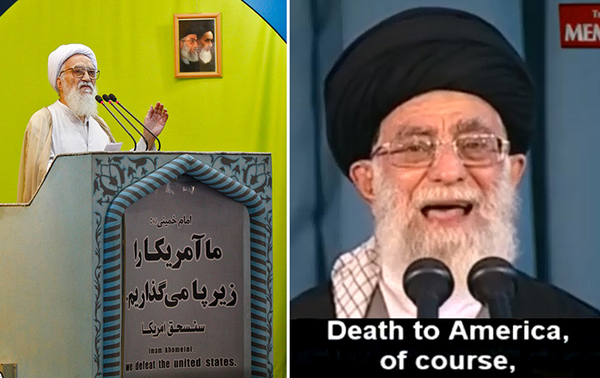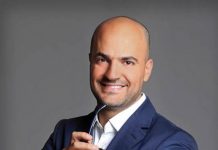Saudi Arabia and holding Hezbollah accountable
Mshari Al Thaydi/Al Arabiya/February 27/16
Two days ago, Al Arabiya and Al-Ekhbariya TV aired a video showing a Lebanese Hezbollah leader – referred to by the nickname Abu Saleh al-Libnani – sitting in a tent explaining to Houthi militants the tactics of terrorism and destruction. He was coaching them how to bomb Saudi cities and carry out suicide attacks in Riyadh, which he considered to be “martyrdom operations.” This video is only the tip of the iceberg. When discussing the identity of the Hezbollah trainer with Yemeni journalist Fahd Taleb al-Sharfi, who comes from Saada city, he recalled a meeting with the former governor of Saada, famous arms dealer Fares Manaa, where the Lebanese terrorist was introduced as an arms dealer from Lebanon.The Souq al-Taleh is the most renowned gathering of arms dealers in Yemen, and Manaa threw a luxurious banquet for his Lebanese guest.
Confirmation
While Hezbollah leader Hassan Nasrallah denies the existence of his party in Yemen, Riyadh “has had evidence for a long time that Hezbollah mercenaries are training Houthi rebels,” said Saudi Brigadier Ahmed Asiri. There are dead members of Hezbollah in Yemen, as confirmed by recently-resigned Lebanese Justice Minister Ashraf Riffi, and by the Yemeni government, which has raised the issue with the United Nations. This may have legal and international ramifications.
Whoever says the reason for the Saudi suspension of aid to Lebanon’s army is the pro-Iran stance of the latter’s Foreign Minister Gibran Bassil is simplifying the situation
Whoever says the reason for the Saudi suspension of aid to Lebanon’s army is the pro-Iran stance of the latter’s Foreign Minister Gibran Bassil is simplifying the situation. Hezbollah has plunged into a real war and dominates the Lebanese government.
Party member and Lebanese Agriculture Minister Hussein al-Hajj Hassan said: “I don’t understand the equation at hand. Either we apologize for a mistake that didn’t happen, or a collective punishment will befall Lebanese allies before enemies. What does this great equation entail? Someone answer me.”
This description of the Saudi position is absurd.
Iran’s Melting Factions and Failing Institutions
Mehdi Khalaji/Washington Institute/Frebruary 27/16
Given the absence of sharp ideological differences and the growing irrelevance of old political categories, those who win office this week may have little actual influence on important issues such as succession, economics, or the next presidential election.
As elections for parliament and the Assembly of Experts played out this week in Iran, the traditional divisions between the country’s various factions — principalist, conservative, moderate, reformist, hardliner — have been of little importance. The grounds for coalition or contention between these camps are less clear, and the boundaries between rival figures and groups are blurring; they can no longer be differentiated so easily based on ideology or agenda. The Islamic Republic’s institutions are weakening, leaving major decisionmaking in the hands of influential personalities and power circles, yet these actors seem to be operating under a more indistinguishable collective mindset.
IDEOLOGICALLY GROUNDLESS POLITICS
The success of the nuclear negotiations has tremendously increased the pressure on President Hassan Rouhani’s government. Such pressure was clearly manifested when the Guardian Council disqualified many candidates associated with him and former president Akbar Hashemi Rafsanjani, barring them from even running in the elections because they did not sufficiently prove their utter loyalty to Supreme Leader Ali Khamenei. This included the overwhelming majority of applicants from Rouhani’s Development and Moderation Party.
Yet these disqualifications cannot be filed under a simple “hardline vs. reformist” label. Rouhani’s party was founded in 2000 but still lacks any clear ideology, agenda, or organized network. Consider the two prominent party members who serve in Rouhani’s government: cabinet spokesman Mohammad Bagher Nobakht is known for his unapologetic association with conservatives, while influential economic advisor Akbar Torkan is close to prominent reformists and was active in Mir Hossein Mousavi’s failed 2009 presidential campaign.
The nuclear deal has caused confusion and division in the conservative camp as well, in large part due to Khamenei’s ambiguous positions throughout the negotiating process. Ali Larijani, the Majlis speaker who used to be seen as a powerful conservative figure, exposed himself to harsh criticism from hardliners by bending toward Rouhani on the nuclear issue. He was punished by being removed from the primary list of conservative candidates in Qom, where he had hoped to run for parliament again. Another example is Kazem Jalali, head of the “Principalists and Followers of Velayat” faction in the Majlis. Long known as an uncompromising hardline critic of Rouhani, he was nevertheless placed in the top list of candidates by pro-Rouhani groups and denounced by his hardline peers leading up to election day, all because he advocated for the nuclear deal. Other well-known hardliners were disqualified, spurring some of their supporters to back “enemy” factions — an approach that disturbed other hardliners.
Thus while pro- and anti-Rouhani groups both sought to polarize the election, neither side was able to form a meaningful consensus over a single candidate list, further intensifying the political disorientation. One of the main reasons for this failure is that ideological differences between the factions are becoming hardly recognizable. On regional policy, Rouhani regards himself as one of the main architects of the longstanding Iranian doctrines developed in the Supreme National Security Council, an institution he was assigned to create and run in 1989 by Khamenei; in fact, he served as the Supreme Leader’s representative on the council until 2013. Likewise, there is hardly any serious dispute on the country’s main economic objectives, partly because Khamenei supplies all three branches of government with the major economic outline. For instance, the regime’s policy on privatization and international trade is not a matter of contention — the main quarrel between various groups is over how such an agenda should be implemented and whose interests must be secured first.
The election campaign reflected this situation, with scarcely any debate on major economic and foreign policy issues. Instead, rival candidates and their supporters explicitly — and correctly — accused each other of corruption. On February 9, Rouhani reiterated his complaints about massive systemic corruption and implicitly identified the Islamic Revolutionary Guard Corps (IRGC) as the main source of the problem, asserting that its large-scale smuggling enterprises were spoiling government efforts to boost domestic production: “When companies want to produce, one corrupt machine — which I do not want to name right now and say how — can import smuggled black market goods, and companies cannot grow.”
On February 16, anti-Rouhani parliamentarian Alireza Zakani responded by arguing that the president is focused on clientelism rather than the people’s true interests and comfort. “In my opinion,” he said, “our president, instead of tracking corruption and corrupt institutions…should look at his own brother [Hossein Fereydoun]. In my opinion, he should look at his own office. In my opinion, he should pay attention to the oil ministry. Mr. Hosseini and elements related to [Oil Minister Bijan] Zanganeh, in the new oil contracts, what fiction are they spreading?”
Preventing factions from developing a consistent and powerful political identity has been the core of Khamenei’s approach to domestic policy. In a public speech on February 24, he rejected the idea that the election is between pro- and anti-Rouhani groups. “In Islamic Iran, there are two poles: Revolution and Arrogance,” he stated, drawing the line between “those who do not believe in the very principle of revolution or the regime and those who do.” He claimed that “foreign propaganda” has fabricated the pro/anti-Rouhani binary: “The Iranian nation wants neither a pro-[Rouhani] Majlis nor an anti-[Rouhani] one. What the Iranian nation wants is a Majlis that knows its duties…is committed to the constitution and Islam, and is brave and unintimidated by America.” He then explained why using “enemies’ vocabulary” is a mistake: “From the first day [of the revolution], enemies have coined terms like ‘moderate’ and ‘hardliner’…In their view Imam [Ruhollah Khomeini] was more hardline than anyone else then. Today they see me as the most hardline. Moderate is a sweet word, but Islam does not speak with such language…When outsiders say ‘hardliners,’ they mean people who are enduring and decisive in their revolutionary approach…’Moderates’ are the people who submit to them…Fortunately, they admit themselves that there is no moderate in Iran; everyone is a hardliner. This is correct.”
In short, the elections seemed to show that the old concepts and categories for describing Iran’s factional politics are outdated and misleading. Given the absence of sharp ideological differences and the fact that the regime’s unelected core has an interest in preventing the formation of powerful parties, it is not clear on what basis future coalitions and groups will be created and how sustainable they will be.
WEAK INSTITUTIONS
As discussed in other recent PolicyWatches, this year’s Assembly of Experts election has attracted unprecedented attention because the elderly Khamenei may die or abdicate during its eight-year term. Yet while the constitution names the assembly as the sole body responsible for appointing a successor, the real decision may already be made beforehand by other influential personalities and circles, including the IRGC.
The Islamic Republic has created hundreds of new political and government offices over the years, but its revolutionary nature has resulted in a persistent anti-institutional mindset. Hence, the constitution does not help much in understanding the topography of today’s main decisionmakers. The manner in which Khamenei made arrangements for filtering assembly candidates for this election was another clear indication that institutions are mostly used as a cover to justify or legitimize regime decisions. For instance, Guardian Council spokesman Nejatollah Ebrahimian recently attempted to step down from his post following an internal dispute over the qualification process for candidates, but chairman Ahmad Jannati did not accept his resignation. On February 10, Ebrahimian told state media that not every council member was included in that process, hinting that Jannati was the main decisionmaker on the issue. More scandalously, he confessed that the legal and executive procedure for qualification was not even clear to him.
WHAT NEXT FOR ROUHANI?
As with any other institution in the Islamic Republic, the history of the Majlis shows that power stems not from government posts and offices, but from other actors and networks. Therefore, even if a considerable number of newly elected legislators claim to support Rouhani’s government, institutional dysfunction will still exacerbate the difficulties he has faced in changing certain domestic policies. He has been frustrated in his efforts to fight deep corruption networks, which expanded under former president Mahmoud Ahmadinejad in order to bypass sanctions, and on which the government now depends to function. Similarly, an inability to deliver on promises regarding social, political, and human-rights issues has made Rouhani more vulnerable. His government is still trying to adjust public expectations that the nuclear accord will have a drastic, direct, and swift impact on daily living conditions. Accordingly, whatever pro-Rouhani faction might emerge in the next Majlis, it will face serious problems shielding him from challenges in the run-up to the next presidential election in 2017.
**Mehdi Khalaji is the Libitzky Family Fellow at The Washington Institute.



















